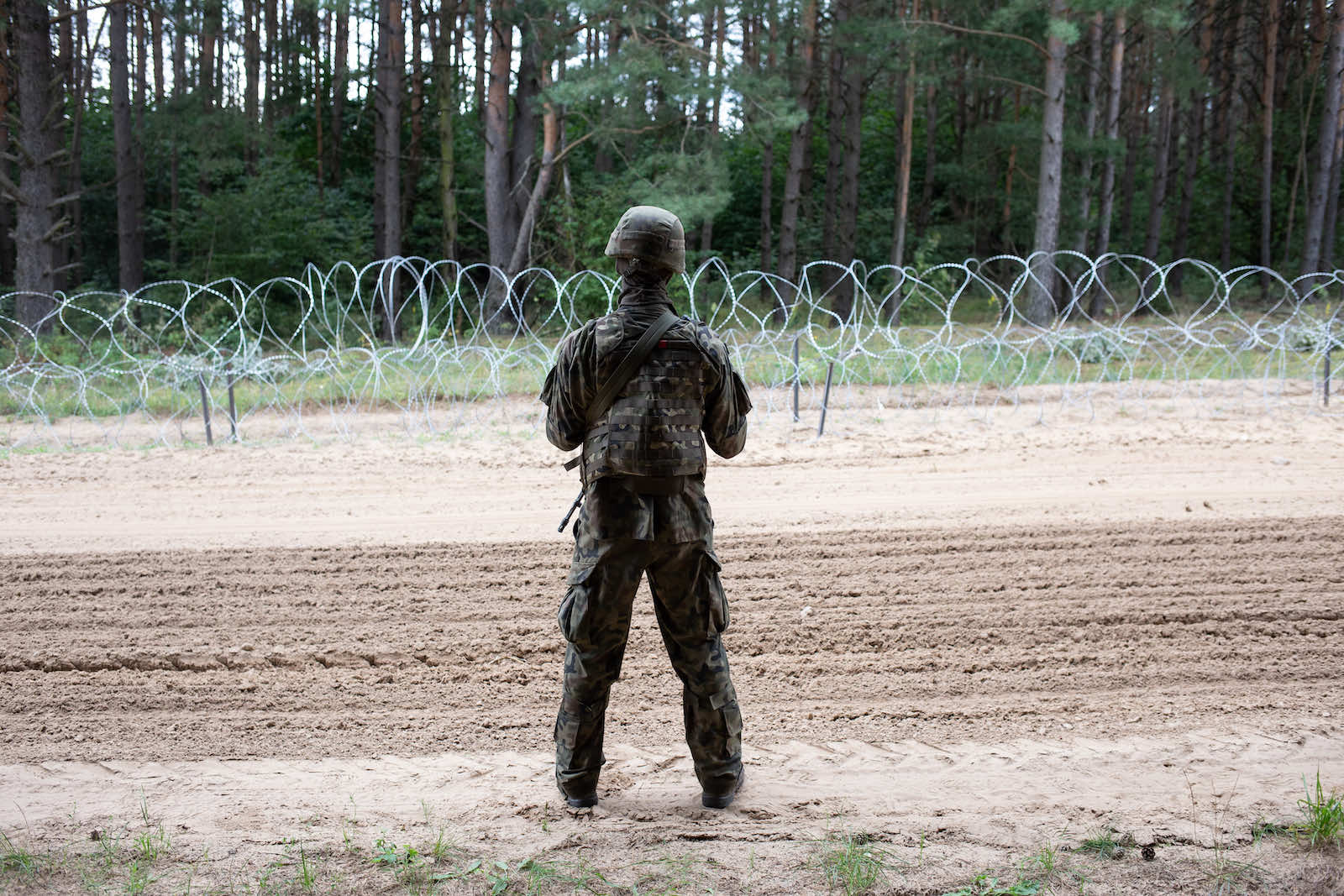MATEO SZLAPEK-SEWILLO

The 418 kilometre border which separates Poland and Belarus does more than divide two states. It forms part of the Eastern border of the European Union and of NATO. Loosely speaking, it partitions “Europe” and “Eurasia”.
Straddled by the Białowieża Forest, Europe’s largest remaining primeval forest, the border zone is one of the continent’s last truly wild places. Today, however, it is the site of a very modern crisis which is confronting European leaders with issues they have struggled to manage in recent years: the hardening of European borders, the ongoing project carried out by some illiberal non-EU regimes to undermine the bloc’s stability, and EU concerns about Poland’s own undemocratic drift.
Beginning in July and early August, asylum seekers from Iraq (mainly Kurds and Yazidis), Yemen, Syria, Afghanistan (displaced by the impending Taliban restoration), African states such as Cameroon, Nigeria and even from as far away as Cuba began crossing into Poland, Lithuania and Latvia from Belarus.
There were a reported 3,500 attempts to cross the Polish-Belarusian border in August, 7,700 in September and 16,800, compared to just 120 such attempts in 2020. Most of these people are seeking asylum in Germany, which is home to an estimated 700,000 Syrian refugees.
In a demonstration of how profoundly the consensus in Brussels has moved toward harder external borders, Poland’s response has broadly been met with support and gratitude by European leaders.
Although disputed by Belarus, the weight of evidence clearly suggests that the Lukashenko regime has been orchestrating these attempted border crossings by luring asylum seekers to Minsk, under the false pretence that from there they can legally enter the European Union. This strategy is thought to be Belarus’s retaliation for Polish and Baltic support for the Belarusian opposition and EU sanctions imposed following rigged 2020 elections.
In a statement this week, European Commission President Ursula von der Leyen confirmed that she had spoken to the Prime Ministers of Poland, Lithuania and Latvia and accused Belarus of an “unacceptable” instrumentalisation of people seeking asylum.
Poland’s ruling Law and Justice Party (PiS), eager to demonstrate its border control credentials, was quick to respond. It imposed a state of emergency at the border zone, effectively barring the presence of media and NGOs and ensuring most news from the area is controlled by government sources. Security forces have been pushing many migrants back over to Belarusian territory, where they face a high risk of violence from authorities and vigilantes, and the government is planning a permanent, “impenetrable” wall along the border.
In a demonstration of how profoundly the consensus in Brussels has moved toward harder external borders, Poland’s response has broadly been met with support and gratitude by European leaders. In a letter, German interior minister Horst Seehofer thanked his Polish counterpart for “protecting our common external border”, and offered to deploy German police to the border to supplement Polish guards.
The chairman of Law and Justice and de-facto leader of Poland, Jarosław Kaczyński, has stated that Belarus is conducting a “hybrid war” with Russian support, to send “economic migrants” (a resonant phrase for Australian readers) to Poland in retaliation for Poland’s support for the Belarusian opposition.
Evidence of Russian involvement is emerging. Russian state media has uncritically taken the side of the Lukashenko regime, while in a recent Telegram post, spokesperson for the Russian Ministry of Foreign Affairs Maria Zakharova commented that since Polish soldiers were part of the Coalition that invaded Iraq in 2003, Poland should accept today’s “grateful Iraqis”.
By focusing attention on people seeking asylum in the European Union, Belarus is reminding member states of the Syrian refugee crisis, which continues to rankle – especially in Germany, where the far-right Alternative für Deutschland emerged as part of a backlash to the accommodation of large numbers of Syrian refugees. And by creating a flashpoint on the Polish border, Belarus is effectively daring Brussels to spring to the aid of a state it has spent recent years quarrelling with.
This strategy – to expose fault lines between Poland and core member states otherwise nervous about Poland’s illiberal drift – will be familiar to anyone who understands how Russia and its allies have sought to undermine EU solidarity and stability.
Recent events indicate a profound escalation at the border. On Tuesday, a large group of asylum seekers arrived at the Kuźnica-Bruzgi crossing, where they were confronted by some of the 12,000 new border guards dispatched by the Polish government hours earlier. Although Belarusian and Russian sources claimed that this group successfully crossed into Poland, the majority were turned back by Polish forces. The asylum seekers, desperate for a positive outcome, have now created an improvised camp at the border zone.
By invoking the threat of “hybrid war”, Poland is reminding European leaders of Russia’s incursion into eastern Ukraine and eventual annexation of Crimea in early 2014. Last week, patrolling Polish soldiers discovered three uniformed, unidentified and armed men on Polish territory. Once confronted, they crossed to the Belarusian side. Perhaps in time we will learn if they were the “little green men“ whose presence in eastern Ukraine was an early sign of what, today, remains the continent’s only live war.
No comments:
Post a Comment